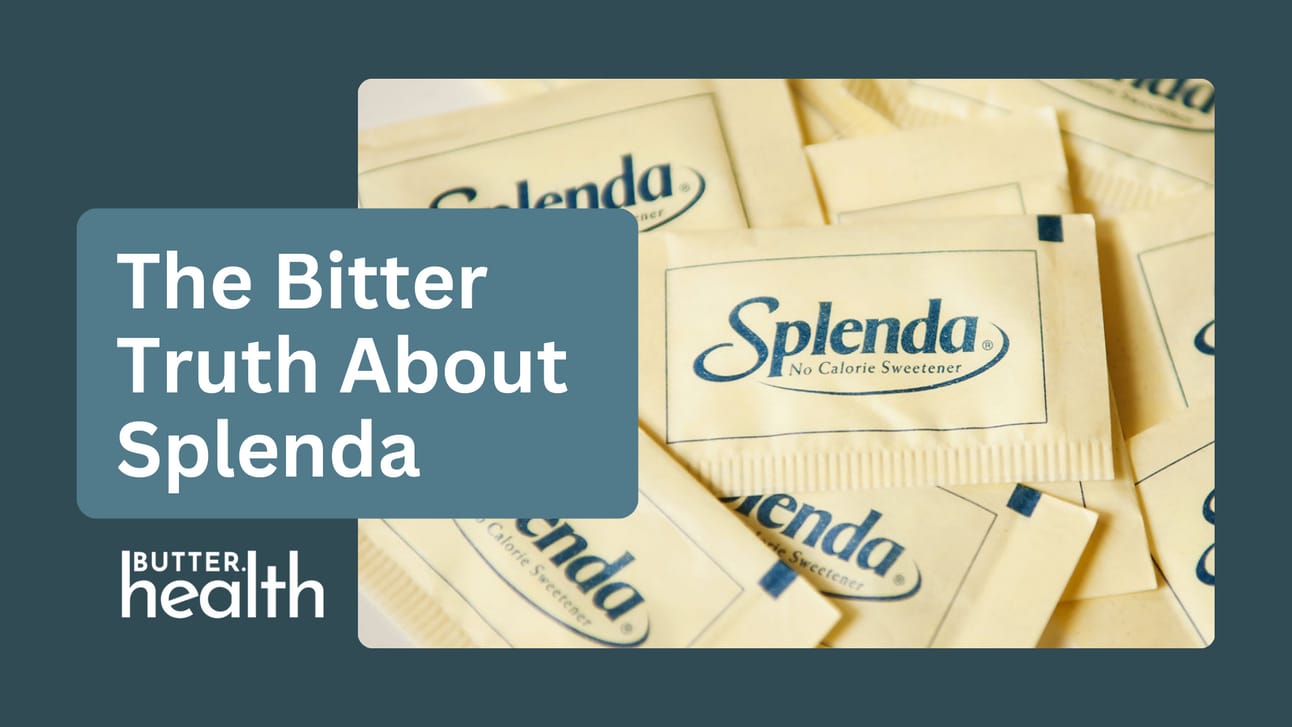That bright yellow packet you grab at the coffee shop or local grocery store is not as sweet as you think. Marketed as a "sugar substitute," it’s sold to us as a safe way to satisfy our sweet tooth without the guilt of real sugar. But here’s the truth you won’t hear from mainstream nutritionists: Splenda is not as innocent as it seems.
What is Splenda, Anyway?
Splenda is a brand name for sucralose, an artificial sweetener that is about 600 times sweeter than sugar. It doesn’t contain calories, so it seems like a smart choice for people trying to reduce their sugar intake, lose weight, or manage blood sugar levels. But just because something has zero calories doesn’t mean it’s good for you.
Splenda and Your Metabolism
Let’s talk about metabolism for a second, because our bodies are complex machines! But here’s where Splenda throws a wrench in the gears. While sucralose doesn’t directly raise blood sugar, it can mess with how your body processes glucose. This is the very thing that fuels your cells.
In 2008, a study published in Pharmacology, Biochemistry, and Behavior found that sucralose increased insulin resistance in rats. That’s bad news for anyone trying to manage blood sugar or avoid diabetes. Insulin resistance means your cells aren’t responding to insulin properly, and over time, this can lead to high blood sugar and eventually Type 2 diabetes.
God made our bodies to function harmoniously with nature, and the last thing we want to do is throw it off balance with artificial substances that mess with that divine design.
Gut Health: Splenda's Silent Attack
It gets worse. Sucralose also impacts your gut microbiome, your body's personal ecosystem of bacteria. Gut health is foundational to overall wellness, influencing everything from digestion to immune function to mental health. But Splenda kills off beneficial bacteria in your gut, making space for the harmful ones.
A study published in Molecules in 2017 showed that sucralose significantly altered the gut microbiota. Translation? Your gut isn’t functioning properly, which leads to inflammation and potentially chronic disease. And when your gut is out of whack, it’s hard for your whole body to thrive.
It’s a Sweet Trick
Here’s a question: Do our cells know the difference between sugar and Splenda? The short answer: not really. While Splenda isn’t exactly sugar, it still tricks your body. When you consume something sweet, your body expects to process glucose. Your mouth and gut respond to sweetness by triggering insulin release, as though real sugar is entering your bloodstream.
But here’s the kicker: there’s no actual sugar in Splenda! So, over time, this disruption messes with your insulin sensitivity and could lead to hormonal chaos. Your body is preparing to process sugar that it never gets. This causes more cravings, more insulin, and eventually, metabolic dysfunction.
Another Problem: Splenda Might Make You Hungrier
While Splenda doesn’t have calories, it could make you eat more in the long run. Here’s why: When you give your body that sweet taste without the actual sugar, your brain is left confused. You’re left hungry, craving more of what’s sweet, and ultimately, you end up eating more processed foods.
In a 2010 study published in Appetite, researchers found that people who regularly consumed artificial sweeteners like Splenda compensated for the “calories saved” by overeating other foods. So while you might think you’re doing your body a favor by swapping out sugar for Splenda, you’re actually setting yourself up to consume more calories overall.
Why Do People Even Use It?
If Splenda is this bad for you, why do people still use it? The main reason is simple: it’s marketed as a way to get the sweetness of sugar without the calories. For people trying to lose weight, avoid sugar spikes, or manage diabetes, it seems like an easy solution.
But if we’re honoring God with our bodies, we should think twice about what we put into them. Artificial sweeteners like Splenda may seem harmless, but they don’t honor the design God created in us. They’re not the answer to our cravings. True satisfaction and health come when we fuel our bodies with real, whole foods—the kind God intended for us.
What to Do Instead?
If you're looking for a sweet alternative, consider natural sweeteners like stevia, monk fruit, or xylitol. These options are less likely to mess with your metabolism or gut health. They’re closer to the real thing (God’s design) and won’t trick your body into chaos.
Depending on your health goals, don’t be afraid to use honey, maple syrup, or date syrup now and then, too!
Splenda Isn’t Worth the Risk
Splenda might not spike your blood sugar directly, but its effects on insulin resistance, gut health, and hunger make it a risky choice in the long run. God designed our bodies to thrive on real, unprocessed food, and putting synthetic substances like Splenda in them isn’t part of that plan.
So the next time you reach for that yellow packet, remember: you don’t have to sacrifice your health for sweetness. True sweetness comes from the good gifts God has given us, not the artificial substitutes that mess with our bodies’ divine design.
Let’s honor God with what we put into our bodies and choose food that truly nourishes us. 🙏
Want help sorting through modern nutrition lies? Book a complimentary discovery call with a Christian Health Coach today.


